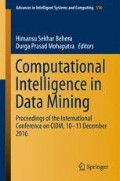Abstract
Recommendation is a very important part of our digital lives. Without recommendation one can get lost in web of data. Movies are also very important form of entertainment. We watch most movies that are recommended by someone or others. Each person likes specific type of movies. So movie recommendation system can increase sales of a movie rent/sales shop. Websites like Netflix are using it. But there is one problem that can cause recommendation system to fail. This problem is sparsity problem. In this paper, we have used a new approach that can solve sparsity problem to a great extent.
Access this chapter
Tax calculation will be finalised at checkout
Purchases are for personal use only
References
Mohammed mahmuda rahumen rahumen lecture, et al contextual recommendation system using multidimensional approch. International journal of intelligent information system august 20, 2013.
Badrul sarwar, joseph konstan john riedl Using filtering agent to improve prediction quality in the grouplen research collaborative filtering Department of computer science and engineering, University of minnesota in year 2008.
Zuping liu sichuon et al. Recommendation algorithm based on user interest, advanced science and technology letters vol. 53, 2014.
Beau piccart, jan struf Alleviating the sparsity problem in collaborative filtering by using an adapted distance and a graph based method. IEEE computer technology Year: 2007.
Badrul sarwar, george karypis, joseph konstan Item based collaborative filtering recommendation algorithm. Department of computer science and engineering, University of Minnesota Year: 2006.
Manos papagelis, dimitris plexousakis Alleviating the sparsity problems of collaborative filtering using trust inferences Institutes of computer science, foundation for research and technology- hellas Years: 2004.
Sanghack Lee and Jihoon Yang and Sung-Yong Park, Discovery of Hidden Similarity on Collaborative Filtering to Overcome Sparsity Problem, Discovery Science, 2007.
Zan Huang, Hsinchun Chen, et al. Applying Associative Retrieval Techniques to Alleviate the Sparsity Problem in Collaborative Filtering. ACM Transactions on Information Systems, Vol. 22, No. 1, January 2004, 116–142. http://dx.doi.org/10.1145/963770.963775.
Cheng-kang-Hsieh, et al. Immersive Recommendation: News and Event Recommendations Using Personal Digital Traces (2016) published in Proceedings of the 25th International Conference on World Wide Web on April 11–15, 2016 at Montréal, Québec, Canada.
Author information
Authors and Affiliations
Corresponding author
Editor information
Editors and Affiliations
Rights and permissions
Copyright information
© 2017 Springer Nature Singapore Pte Ltd.
About this paper
Cite this paper
Mishra, N., Chaturvedi, S., Mishra, V., Srivastava, R., Bargah, P. (2017). Solving Sparsity Problem in Rating-Based Movie Recommendation System. In: Behera, H., Mohapatra, D. (eds) Computational Intelligence in Data Mining. Advances in Intelligent Systems and Computing, vol 556. Springer, Singapore. https://doi.org/10.1007/978-981-10-3874-7_11
Download citation
DOI: https://doi.org/10.1007/978-981-10-3874-7_11
Published:
Publisher Name: Springer, Singapore
Print ISBN: 978-981-10-3873-0
Online ISBN: 978-981-10-3874-7
eBook Packages: EngineeringEngineering (R0)

